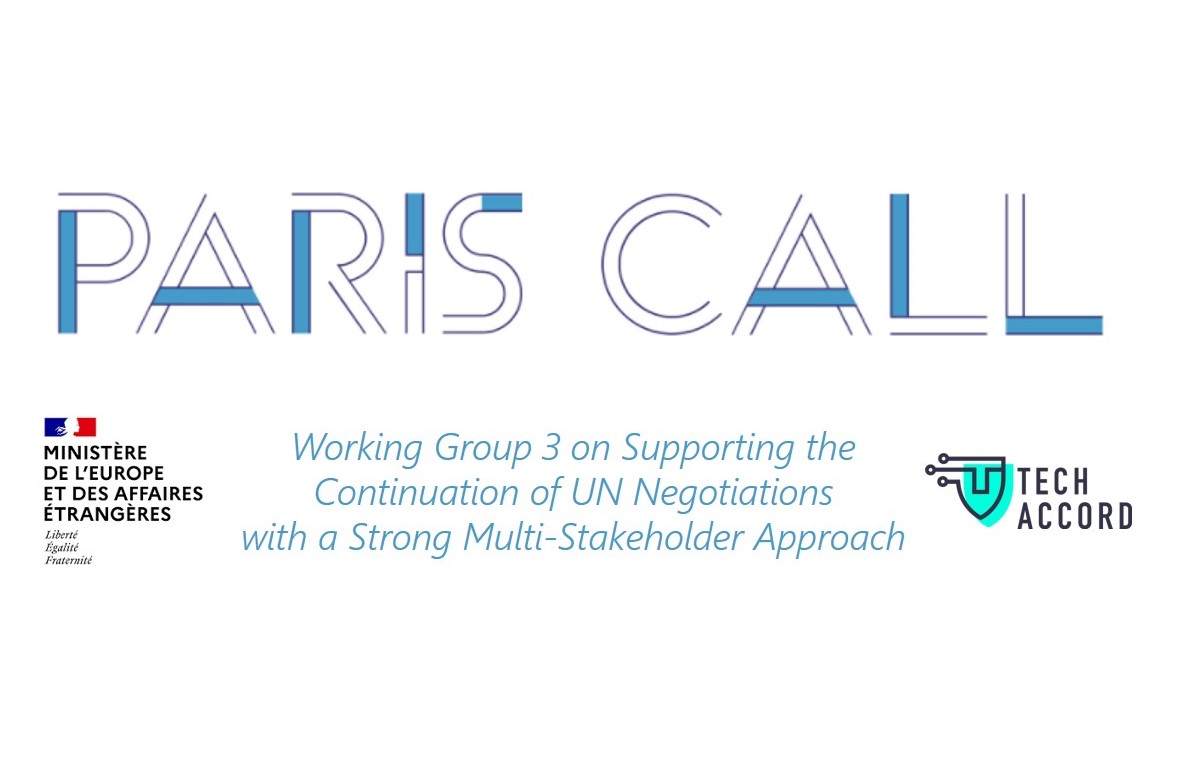Cybersecurity Tech Accord co-leads third working group to support the continuation of UN negotiations with a strong multi-stakeholder approach
Over two years ago, the Paris Call for Trust and Security in Cyberspace launched and united governments, industry, civil society and academia on a common path towards greater stability in cyberspace. The Cybersecurity Tech Accord was one of the initiative’s early supporters, and since then, the Paris Call supporters have grown to include over 1,000 entities, 79 of which are government organizations. During that time, the Cybersecurity Tech Accord also expanded to include over 150 signatories committed to advancing and adhering to the nine principles enshrined in the Paris Call.
Now, a new chapter for the Paris Call community begins. In November 2020, the French government announced the creation of six working groups, leveraging the Paris Call community to advance international norms and cooperate on concrete initiatives that build on the Call’s principles and improve overall cybersecurity posture. The working groups will look at 1) growing the community, 2) engaging emerging countries, 3) supporting the continuation of UN negotiations with a strong multi-stakeholder approach, 4) advancing international norms, 5) building a stability index and 6) offering concrete tools to supporters.
The Cybersecurity Tech Accord is honored to co-lead the implementation of the Paris Call’s third working group to support the ongoing multi-stakeholder dialogue at the UN. Moreover, two of our signatories – Microsoft and F-Secure – are partnering to promote the work on advancing international norms. These two opportunities demonstrate our commitment to collective action in line with our 4th foundational principle – partnering with each other and likeminded groups to enhance cybersecurity.
We look forward to advancing the work of the Paris Call community as we have done in the past. So far, our commitment to the Paris Call had focused on elevating two principles. We have seized a number of opportunities to advance and operationalize Principle 7 on promoting better cyber hygiene. For example, our signatories committed to establishing coordinated vulnerability disclosure policies. Moreover throughout 2020 we have published blogs that explored what basic practices companies and individuals can undertake to protect us all online. These have been collected in the Cyber Hygiene Compendium, published on the second anniversary of the Paris Call.
Secondly, we have worked to demystify Principle 8 that seeks to prevent non-state actors from hacking back. Unfortunately, however, hack back is not as simple to define as the principle might lead you to believe. In order to respond to an ever-changing threat environment, the private sector, especially the technology industry, needs to continuously innovate to create more effective security measures, some of which are more intrusive than others. We therefore published a policy paper that sought to elaborate on the difference between unlawful behavior in cyberspace and measures that companies need to take to maintain good security and defend against malicious activities online.
This new chapter will be an opportunity to further unite the multistakeholder community that has been forged around the international discussions on cybersecurity and that is an essential participant in this dialogue. The online world touches on all aspects of our lives, and it is important that all stakeholders – from human rights organizations to those who operate the internet infrastructure – can contribute to the ongoing debate on how cyberspace should be managed. Indeed, we believe that only a multi-stakeholder approach, focused on improving global prosperity and security, can help us achieve an open, secure, stable, accessible and peaceful cyberspace.
We have taken every opportunity to participate in the UN formal or informal dialogues on the topic and worked hard to ensure our voice was heard. However, the discussions are largely closed to non-governmental stakeholders, and the processes difficult to decipher. Moving forward, we want to ensure that additional stakeholders can participate, on a regular basis, by implementing a more formal yet simplified process.
Multistakeholderism is at the center of the Paris Call itself. It is one of the reasons why we have so enthusiastically endorsed it. UN dialogues on cybersecurity must follow in its lead. We hope that as many Paris Call supporters as possible will join us in this important effort.
We look forward to continuing our work on the Paris Call and the commitment to the principles it represents. For more information on the Paris Call and its principles, please visit https://pariscall.international/en/.
To join the third working group and attend our kick-off session, please register here.

